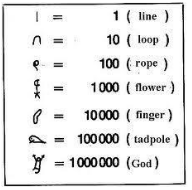Prelims
1/31
There's no tags or description
Looks like no tags are added yet.
Name | Mastery | Learn | Test | Matching | Spaced |
|---|
No study sessions yet.
32 Terms
Computing
any activity that utilizes computers to manage, process, and communicate critical information that is an integral part of modern industrial technology.
The Babylonians
thrived in Mesopotamia (Iraq)
2000 BC until about 500 BC.
What was the numerical system of the babylonians
two symbols ( I = 1 < = 10 )
counting board
usually made of wood and had grooves that allowed beads to be placed at any point of the groove.
abacus
beads in an ____have holes that would enable them to be placed in a specific rod of the ____.
The Egyptians
used a numerical system that had a base of 10 with distinct symbols up to a hundredth thousands.

Rhind papyrus
Writing surface of the Egyptians
The Greeks
Works by Pythagoras and Thales that was centered aroud geometry
Pythagoreans
group of people who followed pythagoras and believe that number is the essence of all things
Thales
States that A, B, and C are points in a circle ans that AC is the circles diameter and <ABC is a right angle
The Romans
Invented the roman numerals
Islamic Influence
Continued the achievements of the greek
a theory was created which used rational and irrational numbers as algebraic objects
Wilheim Gottfried Lebniz
Created the step reckoner, which is an upgraded version of the pascaline first calculator to do basic arithmetic.
developed the binary number
Charles Babbage
Created the prototype of the difference
Grandfather of the computing field
designed to produce mathematical tables, logarithmic, and trigonometric.
Ada Lovelace
Considered the first “computer programming“
George Boole
developed the boolean algebra, which is the foundation of modern computing.
Introduced quantities such as “1“ and “0“, 1 for thinkable objects and 0 for absence of thing
Grace Brewster Murray Hopper
Created the COBOL (common business-Oriented language) in 1959
Katherine Johnson
Her calculations helped space travel to send the astronaut to the moon and back Apollo 1 (1962)
NASA hired people called “Computers“ mainly woman to compute complex calculation (1950)
Gladys Mae West
Created a detailed model of the earth which became the basis of GPS (global positioning system)
second black woman to be hired at the Naval Proving Ground
Cloud Computing
collected data is stored in a “cloud,”
The use
of the cloud lets users open files and use applications anywhere using whichever device has access to the Internet.
Virtualization
simulates hardware functions by creating multiple virtual machines on a physical server that acts as a hardware device
detach software from hardware by converting “physical” devices into “logical” folders or files.
Internet of Things (IoT)
network of an extensive range of physical objectives that
automatically share data over the Internet.
It can be used to accept, locate, monitor, and manage “things” in IoT more reasonably.
Big Data
massive and complex datasets characterized by high
volume, variety of data types, and velocity as data are collected and analyzed at ever-increasing rates.
Artificial Intelligence (AI)
can learn from experience, adjust to new inputs, and do
human-like activities because of this technology.
It has always been regarded as the technology that can change the world on the one hand and end it on the other.
Fog Computing
The data and application sets are stored in edge devices compared to the clouds of cloud computing.
allows local data analytics and management and the
distribution of real-time data insights to customers in different areas such as factories, streetlights, and commodities.
Edge Computing
It deals with a computing infrastructure that is close
to data sources.
It is decentralized and distributed
raw data in edge computing is analyzed locally instead of
transferred to the cloud.
Business Organizations
Businesses use computers to organize data effectively.
will lessen the amount of human error in business management.
Doing so makes error-tracking easier, allowing businesses to arrive at better conclusions based on well-organized data sets.
Banking Industries
industries use computers for better transaction processes.
Bank tellers can easily manage the files and accounts of their customers as quickly as possible using computers.
Education
Advanced technologies are applied in schools for faster delivery of accessible, quality, and higher levels of education.
Learning methods such as blended learning are an innovative approach to providing accurate and focused learning.
Healthcare
Records of patients’ treatment and medical history are
stored in a database easily accessible to doctors.
Using different tools such as medical applications and other hardware equipment is also in place to make diagnosis faster and easier.
Government
With comprehensive computing equipment for storing public information, handling government works makes the customer experience faster and more reliable and creates more accurate results and services.
Robotics
fast-emerging field supports computers for science, engineering, research, and machines.
can help perform several tasks considered complex for human abilities.